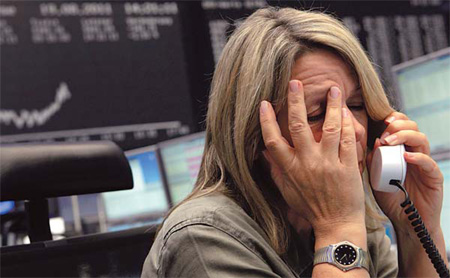Economy
A white knight riding to the rescue?
Updated: 2011-09-26 07:51
By Cai Jing (China Daily)
|
A financial trader in front of a display of the DAX Index curve at the Frankfurt Stock Exchange in Germany. The worsening situation in the eurozone has triggered speculation that the major emerging economies could extend a helping hand. [Hannelore Foerster / Bloomberg] |
Eurozone is looking to emerging economies to solve its debt crisis
BEIJING - China is widely seen to be taking the lead among the so-called BRICS countries (Brazil, Russia, India, China and South Africa) in helping to relieve the pressure on the European Union, which is groaning under the weight of its sovereign debt problems.
Even with its huge foreign exchange reserves of more than $3.2 trillion, it's doubtful whether China can be counted on to act as a lone white knight and slay the eurozone debt dragon. However, repeated displays of confidence in European economies and the eurozone, indicated by increased purchases of European government bonds, have helped instill a degree of calm in the global capital markets and provided much needed stability for the euro.
A Chinese vote of confidence in the European bond market would help matters, according to Carl Weinberg, chief economist at New York-based High Frequency Economics Ltd. However, China alone cannot pick up the slack if the world decides it isn't buying more euroland paper, he was quoted by Forbes as saying.
The BRICS countries should not be seen as saviors with unlimited resources to bail out those European countries hit by the sovereign debt crisis, according to Wang Weihua of the department of international affairs at Shanghai International Studies University.
That view is shared by many other economists and current affairs experts, both in China and overseas.
In a written reply to questions from China Daily, Dan Steinbock, research director of international business at the India, China and America Institute in the United States, said: "Some European leaders are turning to cash-rich China in the hope that Beijing will make significant purchases of their bonds. But the Chinese people are Beijing's first priority."
Also in a written reply to China Daily, Paola Subacchi, research director at the Royal Institute of International Affairs in London, noted that even if the BRICS countries are committed to saving the eurozone, she didn't think "the bond market channel is viable" because "it presents a risk to them (the BRICS)".
Many economists and experts believe that a more realistic course of action for the BRICS countries to lend a hand to troubled Europe would be to increase imports from and investment in the eurozone economies. Over the longer term, "the current euro challenges may support more extensive Sino-European trade and investment, which can boost the economies of the West and East", said Steinbock. "Eurozone countries can provide greater knowledge and capabilities, and the BRICS countries can provide investment and jobs" in Europe, he added.
Shanghai International's Wang agreed. "I believe that a sharp increase in investment in European assets by the BRICS countries would be more effective than direct investment in euro bonds in lifting confidence and creating jobs," he said.
In this respect, China has already set an example: Earlier this year, the country signed agreements with debt-ridden Spain to invest a total of $7.3 billion in projects ranging from energy to banking and oil. What's more, China has agreed to enter into numerous business contracts with Greece, the most severely affected European country.
Indeed, the eurozone is one of China's most important trading partners. Roughly 20 percent of the nation's exports go to the region, and China has become the world's largest market for luxury goods, mainly those from France and Italy. Moreover, some German automakers are selling more vehicles in China than in any of their other overseas markets.
Liu Erfei, head of China operations at Bank of America Merrill Lynch, the corporate and investment banking arm of Bank of America Corp, is reported in the local media to have urged Chinese enterprises to be more active in looking for assets at bargain basement prices in Italy and other eurozone countries. Yao Ling, a researcher at the Chinese Academy of International Trade and Economic Cooperation under the Ministry of Commerce, was quoted in the Chinese press as saying that the investment environment in Europe is ripe for exploitation.
In the past, many Europeans viewed Chinese industrial investments with suspicion and hostility, but now "they want us to be there", Yao said.
Investing in Europe is nothing new to Chinese business people. In fact, long before the outbreak of the region's sovereign debt crisis, Chinese entrepreneurs, especially those from Wenzhou in Zhejiang province, had bought garment-manufacturing facilities, or opened their own factories in Italy, to make goods for export to the Chinese market.
To further facilitate trade and investment, European countries have been asked to recognize China as a market-oriented economy ahead of the World Trade Organization's scheduled date for doing so in 2016.
Chinese Premier Wen Jiabao has said he will bring up the matter at his meeting with European leaders next month and expressed hopes of a breakthrough then.
Zhang Haizhou in London and Xu Xiaomeng and He Wei in Shanghai contributed to this story.
E-paper

Pearl paradise
Dreams of a 'crazy' man turned out to be a real pearler for city
Literary beacon
Venice of china
Up to the mark
Specials

Power of profit
Western companies can learn from management practices of firms in emerging economies

Test of character
Keyboard-dependent Chinese are returning to school because they have forgotten how to write

Foreign-friendly skies
About a year ago, 48-year-old Roy Weinberg gave up his job with US Airways, moved to Shanghai and became a captain for China's Spring Airlines.

